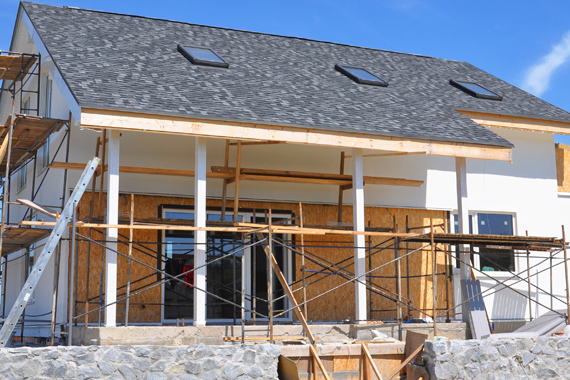
What is conversion finance? Let’s find out so you can better understand development finance.

Not all property development projects are large-scale construction works, or involve building from the ground up. Often it’s more profitable to exploit an existing structure, turning a building that once was uninhabitable (or at least undesirable) into one which is easy to sell. However, as with many other types of property development, it’s necessary for developers to source a secure, stable finance stream to accommodate all the expenses which accompany a conversion project.
While a conversion may not necessarily involve the actual laying of foundations or erection of walls, it can very often require extensive works to be carried out; internal walls may need to be created or demolished, and the property might well require substantial remodelling to meet the developer’s objectives. It’s not a small job, and it requires a good deal of financial clout to carry out a conversion project. Consequently, there are many specialist lenders dedicated to providing financial solutions for conversion projects, and who can create bespoke lending packages that match the needs of their clients. In this article we’ll examine the demands of conversion development and how lenders in this sector meet these needs; we’ll also cover some of the key aspects of this type of loan. As always, it’s important to bear in mind that conversion finance is a type of loan, and must be repaid with interest; before committing to a loan of this type, developers should seek the advice of a qualified financial advisor.
Finance is always a part of property development. Apart from the fact that few developers can afford to put up the millions of pounds to buy a property outright, it’s often not advisable for them to do so. While developers will need to pay interest on any money they borrow, there are many advantages to borrowing over using capital. First amongst these is the ability to remain flexible, which is key to success within the property development sector - a developer that sinks all of their available capital into a single project is putting all the eggs in one basket. They’re unable to diversify their investments, and can’t therefore take on other projects until they’ve completed their first one. This means there’s an opportunity cost associated with capital purchases. It also leaves the developer vulnerable to changes in the market, because a drop in their property’s value could easily be enough to sink them.
For these reasons, conversion finance is a vital element of any conversion development. Property developers will often choose to borrow money when possible, even if they can afford to pay for the work upfront - there are many benefits to remaining financially adaptable in a fast-moving market.
Conversion loans are used for a wide variety of reasons, and the sheer diversity of conversion projects in real estate development means that conversion loans come in all shapes and sizes. However, while every lender will have a comprehensive suite of loan products to suit every situation, there are some features which all conversion loans have in common. The specifics may change, but the fundamentals are usually the same:
Secured: Extensive conversions aren’t cheap, and require a lot of money. It’s not uncommon for a large conversion project to run into the hundreds of thousands of pounds, and there are no lenders who can afford to supply this kind of money without a “Plan B” in case the borrower fails to repay. Therefore, conversion loans are typically secured against the property that’s being converted, giving the lender the ability to sell the property and recoup their money if the loan isn’t repaid on time. Because the loan is secured against the property’s value, lenders will need to carefully evaluate how much the property is worth (and how much it will eventually be worth), and will then provide funding in proportion to the property’s value. It’s important to note that the property’s value will increase as work goes on, and the lender will often need to revisit and revalue the site during the course of the project before they provide the next “tranche” (installment) of the loan.
Flexibility: There is no such thing as a “typical” conversion project, and each and every development will have its own timescale, objectives and challenges. This means that conversion finance lenders have to adapt to the different needs of their clients, and can’t simply adopt a “one size fits all” policy; each and every developer receives the bespoke treatment they need. This means that the loans a conversion lender makes will be tailored to enhance rather than hamper the profitability of a conversion, a far cry from the rigid policies of mainstream lenders.
Speed: Conversions themselves may take several months to complete, but the property development market is intensely competitive. Especially in the initial phases of a development, investors need to move very quickly indeed to seize opportunities ahead of the competition, which means they need a lender who can work within an extremely pressured timescale. Conversion finance providers are able to accommodate these demands, and can usually fulfil a loan within a matter of days (some lenders even boast of being able to turn a loan around in just 24 hours, often acting as an emergency funding source to save a project from repossession).
Conversion projects can be large or small, extensive or cosmetic, but they all share one thing in common; they need to be supplied with sufficient cashflow to ensure they mature on time and on budget. There are many specialist lenders operating within the market that can supply just this, and are able to empower property developers with the tools they need to act quickly and confidently when necessary. Without this finance, developers would be hamstrung and constrained by their capital cashflow and unable to work flexibly - conversion finance is a vital part of the real estate development machine, and developers should have a keen grasp of how it can keep their developments moving forward.
A bridging loan is a short-term loan secured against property. It allows you or your business to “bridge a gap” until either longer-term finance can be arranged, or the underlying security or other assets can be sold.
Loans generally range from £25,000 to many millions depending on the size and complexity of the planned development. The amount that can be borrowed depends on the strength of the development proposition, the location, the potential profits, the perceived risks and of course ultimately on the lenders risk appetite.
Yes. Rates are generally a little higher for development finance which reflects the greater complexity and slightly higher risk associated with this form of lending.
Experienced developers, some of whom rent out completed properties, often use property they already own within their portfolio to secure lending. With enough equity in an existing portfolio finance can be secured to buy more properties or land for future projects.